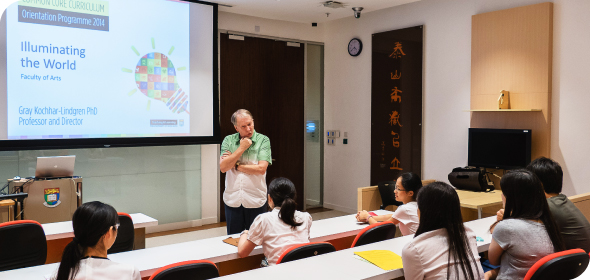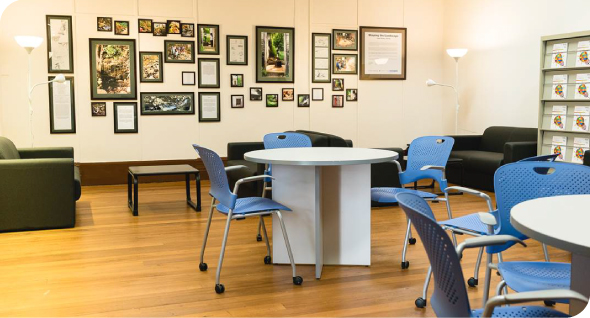When HKU began preparations to move from a three-year to four-year undergraduate curriculum a few years back, it decided to re-envision university education. Students would not only learn their chosen disciplines, they would undertake such things as tackling novel and ill-defined problems, making connections across areas of knowledge, and increasing their capacity to make a positive difference in the world. Central to that vision has been the Common Core.
The Common Core requires all students to take six courses that cut across disciplines and address issues of importance to our times, such as climate change, the impact of big data, sexuality and gender, global ethics, and China in the world order. Five years since being launched, the programme has received enthusiastic feedback from both students and staff. It now also has a new Director.
Professor Gray Kochhar-Lindgren comes to HKU from the University of Washington, Bothell, where he was Associate Vice-Chancellor for Undergraduate Learning and Professor of Interdisciplinary Arts and Sciences. He previously spent 10 months in Hong Kong in 2009–10 as a Fulbright Scholar helping universities across the city prepare for the new curriculum, but he was particularly impressed with the interdisciplinary design of the Common Core.
“HKU has done an extremely sophisticated job in thinking through how to fulfil the needs of a four-year curriculum and also take into account a new situation between the University and the rest of the world at large,” he said.
“There’s a transition going on, partly because of technology and partly globalisation, where universities are now responsible both for deepening specialised knowledge and for a corollary development of global citizenship and creative preparation for the knowledge economy.
“That gives something like the Common Core a chance to do really deep intellectual work and deep socially-oriented work that will prepare students for less pre-defined careers and more flexibility.”
Many of the issues the Common Core is dealing with have connection to the issues Hong Kong as a city is dealing with, whether it be bioinformatics, environmentalism, Chinese studies or urban art.
Enhancing student voices
The challenge for Professor Kochhar-Lindgren will be figuring out where, with collaboration from across the campus, to take the programme in its next phase. Under the leadership of Professor Amy Tsui (former Pro- Vice-Chancellor [Teaching and Learning]) and Mr Gwyn Edwards (former Director and currently Deputy Director of the Common Core), and with input from all the faculties, the Common Core has developed its strengths and offers more than 170 courses in four areas of inquiry (Scientific and Technological Literacy, Humanities, Global Issues, and China: Culture, State and Society).
“It’s an intriguing moment in the history of the Common Core,” Professor Kochhar-Lindgren said. “It offers a very rich set of opportunities for students and staff and it is institutionally well established, but now it needs to be re-energised, expanded in ways that include more student voices and a greater flexibility, and to be financially and intellectually sustained over time.”
Professor Kochhar-Lindgren, who arrived in June, already has plans underway. One is to share students’ work with a wider audience through exhibitions and events in the new Common Core Lounge. Another is to recruit Student Common Core Ambassadors to provide feedback to the University and speak to students, peer to peer.
He also will appoint an advisory group of interested individuals, such as parents and people in business and community leadership, who could help to develop the potential for the Common Core to be more closely linked to the needs and opportunities of the city.
 Professor Kochhar-Lindgren meeting students at the Common Core orientation programme.
Professor Kochhar-Lindgren meeting students at the Common Core orientation programme.
Connecting to the city
“Many of the issues the Common Core is dealing with have connection to the issues Hong Kong as a city is dealing with, whether it be bioinformatics, environmentalism, Chinese studies or urban art. One of the things I hope to encourage is this flow of pathways between the campus and the city, by getting students to ‘de-familiarise’ themselves with the city and then see it with fresh eyes.”
A limitation in achieving that goal is class size, which can reach up to 120 or more students. The curriculum committee is exploring possibilities of online and blended teaching and different configurations of the coursework, and continuing to find resources to support active teaching methods, he said. Teaching support is also continuing to be provided to both tutors and professors to help them keep students engaged with the course material.
Professor Kochhar-Lindgren is also preparing to join the HKU curricular innovations at the ground level. He has enrolled in the HKU x MOOC (Massive Open Online Courses) on epidemics and he and Mr Edwards are jointly developing a Common Core course called ‘On the Move: Place-Making and Identity’, which they hope to get approved and launched by early next year.■
 The newly opened Common Core Lounge in the Main Building is an ideal venue for exhibitions, lectures and events.
The newly opened Common Core Lounge in the Main Building is an ideal venue for exhibitions, lectures and events.


